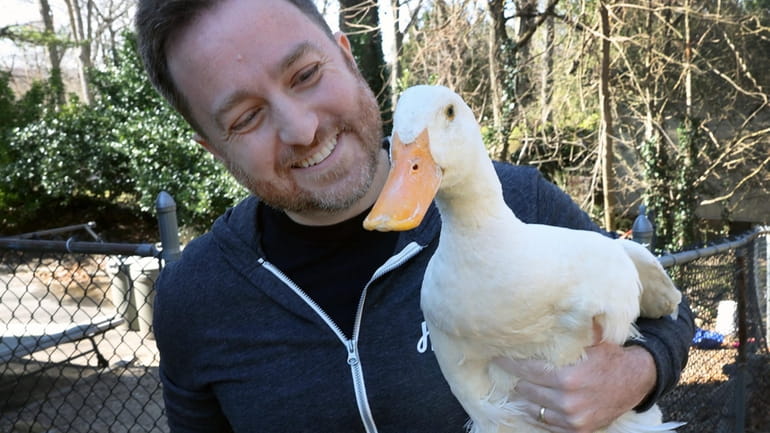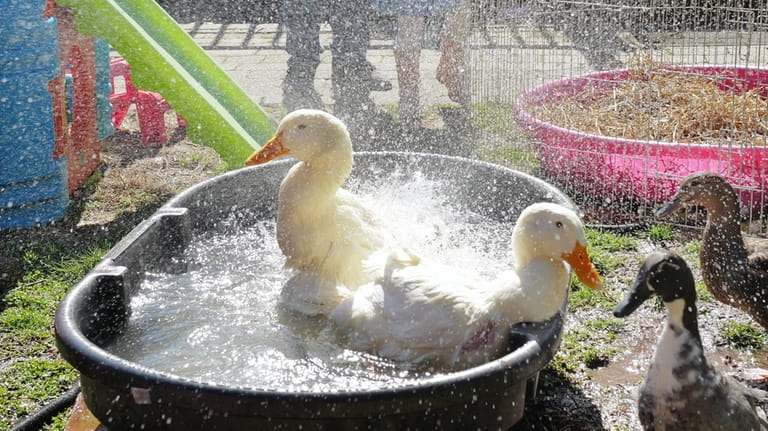Long Island rescuers highlight plight of discarded ducks, bunnies

The fortunes are better for Mr. Quackers, above Sunday being held by John Di Leonardo, executive director of Humane Long Island, than a few weeks ago when the white Pekin duck was abandoned with a slim chance of survival. Credit: Debbie Egan-Chin
Mr. Quackers, a white Pekin duck, lives the good life in Bayville — foster dad Benjamin Silverman and his family dote on the waterfowl while caring for its injured right foot and other health conditions.
Two weeks ago, whether Mr. Quackers would live at all was in doubt. The duck had been rescued from a creek in North Babylon, covered with feather lice, and infections in its eyes and feet. One of the infections spread to the duck's bones.
But with treatment Mr. Quackers is healing — just one of scores of unwanted domesticated ducks and rabbits left in places like Long Island waterways and parks, experts said. The animals sometimes start out as Easter gifts or props, abandoned by their owners, and with slim chances of survival.
“They are as different from a wild duck as a house cat is from a tiger,” said John Di Leonardo, an anthrozoologist and executive director of Humane Long Island.
Releasing ducks like Mr. Quackers into the wild is likely a death sentence. They have large bodies and small wings, cannot fly, do not have camouflage to help hide from predators and sometimes they freeze to the ice in winter, Di Leonardo said.
“These animals are sensitive, complex beings,” he said. “They're not photo props, they're not school science experiments. They're not gifts.”
And when they are injured or sick, Di Leonardo said, his group can pay hundreds of dollars or more on medical care, even with discounts from sympathetic veterinarians.
“So maybe you spend $10 on a little chick but then thousands in vet bills,” he said.
Bunnies suffer similar fates after Easter, when people realize they require substantial upkeep, including constant feedings and plenty of space to roam.
“When people take in these bunnies as gifts or, or purchase them in this manner, a lot of times they don't view them as an animal that you would bring to a vet and spend money on,” said Noelle Dunlop, director of development at the Evelyn Alexander Wildlife Rescue Center in Hampton Bays.
Every year, Dunlop added, “there are domestic ducks and bunnies found by the side of the road or just random places where they just cannot survive.”
When the center gets calls for abandoned or injured domesticated ducks and bunnies, it works with rescue partners to get the animals to safety.
“Bunnies are a 10-year commitment,” Dunlop said. “Those small hutches sold in stores are not enough space for a bunny. You never want them to run out of food because that is the way their gut system works and they produce a lot of poop.”
Di Leonardo was contacted by a homeowner about Mr. Quackers after she noticed several white ducks in a creek. A number of them had disappeared and one of them was limping. Silverman agreed to foster the duck while it recovers, and gets ready to go to a forever home.
In Silverman’s backyard, several other rescued ducks play happily in a small pool or pick through the grass. Silverman saw two of the ducks, a Rouen and a blue Swedish, hanging around outside his gym for several days. Both are domesticated breeds that would not do well in the wilds of Long Island.
“I kept seeing them almost run over,” he said. “So I called John and he told me they could help me catch them but they didn’t have any fosters. That’s pretty much how I started.”
His family also took in a bunny a friend received as a gift but didn’t feel they could care for it. Lola (also called “Bunny”) now has lots of space and enrichment toys to keep her busy.
Di Leonardo said people who are willing to take on the commitment of having a domesticated duck or rabbit should adopt from an animal shelter and not purchase them. Several shelters on Long Island have rabbits in need of good homes.
Anyone who sees a domesticated duck or rabbit out in a public space should call a wildlife rehabilitator for guidance.
“All these animals have an emotional spectrum,” Silverman said. “Some people really think if it’s not a dog or a cat, it’s just a 'dumb animal,' but all these animals are special in their own way.”
Mr. Quackers, a white Pekin duck, lives the good life in Bayville — foster dad Benjamin Silverman and his family dote on the waterfowl while caring for its injured right foot and other health conditions.
Two weeks ago, whether Mr. Quackers would live at all was in doubt. The duck had been rescued from a creek in North Babylon, covered with feather lice, and infections in its eyes and feet. One of the infections spread to the duck's bones.
But with treatment Mr. Quackers is healing — just one of scores of unwanted domesticated ducks and rabbits left in places like Long Island waterways and parks, experts said. The animals sometimes start out as Easter gifts or props, abandoned by their owners, and with slim chances of survival.
“They are as different from a wild duck as a house cat is from a tiger,” said John Di Leonardo, an anthrozoologist and executive director of Humane Long Island.
WHAT TO KNOW
- Animal rescuers on Long Island urge people to not buy chicks and bunnies as Easter gifts and props.
- These domesticated animals often end up abandoned in ponds and the woods where they have little chance of survival.
- Anyone who spots a domesticated bunny or duck out in a public space should contact a wildlife rehabilitator for guidance.
Likely death sentence
Releasing ducks like Mr. Quackers into the wild is likely a death sentence. They have large bodies and small wings, cannot fly, do not have camouflage to help hide from predators and sometimes they freeze to the ice in winter, Di Leonardo said.
“These animals are sensitive, complex beings,” he said. “They're not photo props, they're not school science experiments. They're not gifts.”
And when they are injured or sick, Di Leonardo said, his group can pay hundreds of dollars or more on medical care, even with discounts from sympathetic veterinarians.
“So maybe you spend $10 on a little chick but then thousands in vet bills,” he said.

It was bath time Sunday in the Silvermans' backyard in Bayville for the family's rescued ducks. Credit: Debbie Egan-Chin
Bunnies suffer similar fates after Easter, when people realize they require substantial upkeep, including constant feedings and plenty of space to roam.
“When people take in these bunnies as gifts or, or purchase them in this manner, a lot of times they don't view them as an animal that you would bring to a vet and spend money on,” said Noelle Dunlop, director of development at the Evelyn Alexander Wildlife Rescue Center in Hampton Bays.
Every year, Dunlop added, “there are domestic ducks and bunnies found by the side of the road or just random places where they just cannot survive.”
When the center gets calls for abandoned or injured domesticated ducks and bunnies, it works with rescue partners to get the animals to safety.
'10-year commitment'
“Bunnies are a 10-year commitment,” Dunlop said. “Those small hutches sold in stores are not enough space for a bunny. You never want them to run out of food because that is the way their gut system works and they produce a lot of poop.”
Di Leonardo was contacted by a homeowner about Mr. Quackers after she noticed several white ducks in a creek. A number of them had disappeared and one of them was limping. Silverman agreed to foster the duck while it recovers, and gets ready to go to a forever home.
In Silverman’s backyard, several other rescued ducks play happily in a small pool or pick through the grass. Silverman saw two of the ducks, a Rouen and a blue Swedish, hanging around outside his gym for several days. Both are domesticated breeds that would not do well in the wilds of Long Island.
“I kept seeing them almost run over,” he said. “So I called John and he told me they could help me catch them but they didn’t have any fosters. That’s pretty much how I started.”
His family also took in a bunny a friend received as a gift but didn’t feel they could care for it. Lola (also called “Bunny”) now has lots of space and enrichment toys to keep her busy.
Di Leonardo said people who are willing to take on the commitment of having a domesticated duck or rabbit should adopt from an animal shelter and not purchase them. Several shelters on Long Island have rabbits in need of good homes.
Anyone who sees a domesticated duck or rabbit out in a public space should call a wildlife rehabilitator for guidance.
“All these animals have an emotional spectrum,” Silverman said. “Some people really think if it’s not a dog or a cat, it’s just a 'dumb animal,' but all these animals are special in their own way.”
Two body parts suspects in court ... Teen chicken keeper ... Rangers advance ... Penn upgrades
Two body parts suspects in court ... Teen chicken keeper ... Rangers advance ... Penn upgrades

